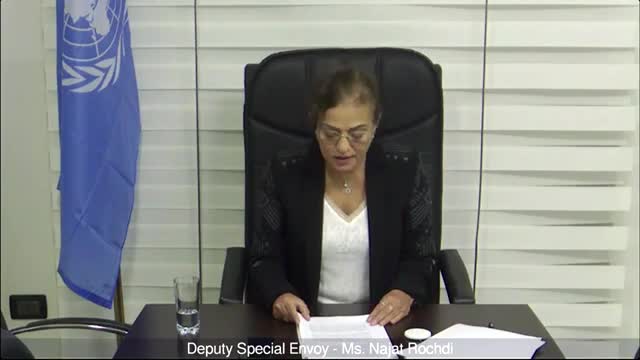UN briefing urges lifting sanctions and export‑control relief to support Syrian transition
October 23, 2025 | United Nations, Federal
This article was created by AI summarizing key points discussed. AI makes mistakes, so for full details and context, please refer to the video of the full meeting. Please report any errors so we can fix them. Report an error »

Najat Rushdie, briefing the United Nations Security Council from Damascus, called for a rapid and larger easing of sanctions and export‑control measures to allow investment and reconstruction needed for Syria’s political transition.
Rushdie said the economic consequences of 14 years of conflict and decades of authoritarian rule impose severe constraints on recovery, and she framed sanctions relief as critical to giving the transition “a chance to succeed.” She welcomed a U.S. government appeal for repeal of the Caesar Act and said developments in the U.S. legislative process could pave the way for renewed foreign investment and reconstruction.
“Export controls relief is needed too, including with governments, reassuring banks and companies that business with Syria is legal and worth the risk,” Rushdie said.
She stressed that an enabling environment for investments will also require domestic reforms and transitional steps by interim authorities to bolster investor and donor confidence, and that substantial tangible international support will be needed for millions of Syrians affected by conflict.
Rushdie noted the United Nations has counseled transparency and inclusivity in recent electoral steps and said the UN stands ready to assist where requested. She linked economic recovery to parallel progress on accountability and transitional justice, saying clear next steps and publication of investigative findings are necessary for wider political confidence.
The briefing did not specify dollar amounts for reconstruction or identify particular donor commitments. Rushdie called for coordinated international action — including policy changes, export controls relief and domestic reforms — but did not report any formal international agreements or timelines arising from the meeting.
Her remarks made clear that international relief from sanctions and private‑sector reengagement are viewed as prerequisites to substantial reconstruction and investment in Syria’s transition.
Rushdie said the economic consequences of 14 years of conflict and decades of authoritarian rule impose severe constraints on recovery, and she framed sanctions relief as critical to giving the transition “a chance to succeed.” She welcomed a U.S. government appeal for repeal of the Caesar Act and said developments in the U.S. legislative process could pave the way for renewed foreign investment and reconstruction.
“Export controls relief is needed too, including with governments, reassuring banks and companies that business with Syria is legal and worth the risk,” Rushdie said.
She stressed that an enabling environment for investments will also require domestic reforms and transitional steps by interim authorities to bolster investor and donor confidence, and that substantial tangible international support will be needed for millions of Syrians affected by conflict.
Rushdie noted the United Nations has counseled transparency and inclusivity in recent electoral steps and said the UN stands ready to assist where requested. She linked economic recovery to parallel progress on accountability and transitional justice, saying clear next steps and publication of investigative findings are necessary for wider political confidence.
The briefing did not specify dollar amounts for reconstruction or identify particular donor commitments. Rushdie called for coordinated international action — including policy changes, export controls relief and domestic reforms — but did not report any formal international agreements or timelines arising from the meeting.
Her remarks made clear that international relief from sanctions and private‑sector reengagement are viewed as prerequisites to substantial reconstruction and investment in Syria’s transition.
View the Full Meeting & All Its Details
This article offers just a summary. Unlock complete video, transcripts, and insights as a Founder Member.
✓
Watch full, unedited meeting videos
✓
Search every word spoken in unlimited transcripts
✓
AI summaries & real-time alerts (all government levels)
✓
Permanent access to expanding government content
30-day money-back guarantee
